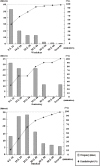A novel subjective sleep assessment tool for healthy elementary school children in Japan
- PMID: 20179368
- PMCID: PMC3920410
- DOI: 10.2188/jea.je20090174
A novel subjective sleep assessment tool for healthy elementary school children in Japan
Abstract
Background: A child's sleep pattern is important in defining his or her mental and physical well-being. Although we have reported previously on the utility of collecting 2 weeks of daily sleep logs, this type of record keeping is often onerous for the parents. Therefore, we established a new questionnaire, called the Japan Children's Study Sleep Questionnaire (JCSSQ), which is used to collect sleep pattern data over 4 weeks, including weekdays, Saturdays, Sundays, and holidays.
Methods: Two parent-administered sleep assessment tools, the JCSSQ and a daily sleep log, were used to examine the sleeping patterns of 105 school children (58 boys and 47 girls; age range, 6-12 years) in Fukuoka, Japan. Parents were requested to record sleep logs for 14 days after the JCSSQ. Sleep/wake status was recorded on the sleep log, from which data on the parameters of "sleep onset time", "waking time", "sleep period", and "number of nights waking" were extracted.
Results: There were no significant differences between the JCSSQ and the logs for waking time data collected on weekdays, Saturdays, and Sundays. However, there was a significant difference (P = 0.03) between the JCSSQ and the sleep logs with respect to the sleep onset time data collected on Saturdays.
Conclusions: The JCSSQ was easy to fill out, and the data collected using the JCSSQ on weekdays were both valid and generally consistent with those collected using sleep logs. However, for sampling on Saturdays and Sundays, the JCSSQ data did not correlate with the sleep log data.
Figures


Similar articles
-
Utility of subjective sleep assessment tools for healthy preschool children: a comparative study between sleep logs, questionnaires, and actigraphy.J Epidemiol. 2010;20(2):143-9. doi: 10.2188/jea.je20090054. Epub 2010 Feb 6. J Epidemiol. 2010. PMID: 20139658 Free PMC article.
-
[Analysis of parent-child sleeping and living habits related to later bedtimes in children].Fukuoka Igaku Zasshi. 2012 Jan;103(1):12-23. Fukuoka Igaku Zasshi. 2012. PMID: 22423499 Japanese.
-
Environmental and behavioural factors associated with school children's sleep in Aotearoa/New Zealand.J Paediatr Child Health. 2017 Jan;53(1):68-74. doi: 10.1111/jpc.13268. Epub 2016 Sep 1. J Paediatr Child Health. 2017. PMID: 27586066
-
Validity of child sleep diary questionnaire among junior high school children.J Epidemiol. 2004 Jan;14(1):1-4. doi: 10.2188/jea.14.1. J Epidemiol. 2004. PMID: 15065685 Free PMC article.
-
Epidemiological study on chronotype among preschool children in Japan: Prevalence, sleep-wake patterns, and associated factors.Chronobiol Int. 2016;33(10):1340-1350. doi: 10.1080/07420528.2016.1217231. Epub 2016 Aug 18. Chronobiol Int. 2016. PMID: 27538100
Cited by
-
Measuring sleep health in primary school-aged children: A systematic review of instruments and their content validity.Sleep. 2022 Nov 9;45(11):zsac215. doi: 10.1093/sleep/zsac215. Sleep. 2022. PMID: 36087112 Free PMC article.
-
The relationship between the development of social competence and sleep in infants: a longitudinal study.Child Adolesc Psychiatry Ment Health. 2018 Dec 18;12:53. doi: 10.1186/s13034-018-0258-8. eCollection 2018. Child Adolesc Psychiatry Ment Health. 2018. PMID: 30568728 Free PMC article.
References
-
- Acebo C , Sadeh A , Seifer R , Tzischinsky O , Hafer A , Carskadon MA. Sleep/wake patterns derived from activity monitoring and maternal report for healthy 1- to 5-year-old children . Sleep. 2005;28:1568–77 - PubMed
-
- Sadeh A Evaluating night waking in sleep-disturbed infants: a methodological study of parental reports and actigraphy . Sleep. 1996;19:757–62 - PubMed

